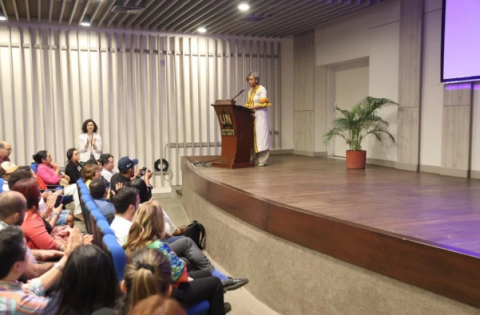
GCED Basic Search Form
Quick Search
You are here
News

8 June 2023
During the regional forum, Latin American and Caribbean countries presented the challenges and transformative practices to strengthen educational inclusion, eliminating all kinds of obstacles for the continuity of the educational paths of the displaced population.
In the context of the regional forum "Education beyond borders" organized by the Regional Bureau for Education in Latin America and the Caribbean (OREALC/UNESCO Santiago), the Minister of Education, Aurora Vergara Figueroa, reaffirmed the commitment of the Colombian government to guarantee the right to education for people in situations of human mobility.
"Colombia is committed to the right to education for people in situations of human mobility, within the framework of a regional integration agenda that allows a response from an inclusion and development perspective," said Minister Aurora Vergara Figueroa.
The speech was made during the closing of the regional event, organized by the Government of Colombia and UNESCO, in coordination with the Regional Education Group and with the support of Education Cannot Wait and the Government of Canada.
According to UNESCO and its partners, as a result of emergencies and crises in Latin America and the Caribbean, about 3.7 million girls, boys and adolescents are in processes of migration and displacement with the hope of finding a better life opportunity and access to basic services.
"The guarantee of the right to education for the population in mobility situations has been a great challenge for our countries. Since the first version of the Regional Forum, progress in ensuring access for students to host education systems has been extraordinary. However, Latin America and the Caribbean must not spare efforts to ensure the elimination of all obstacles to ensure permanence and completion of studies. The message of the 16 participating countries is clear: the priority in the coming years will be the guarantee of the quality of teaching and learning, without any distinction," said Claudia Uribe, Director of the Regional Bureau for Education in Latin America and the Caribbean (OREALC/UNESCO Santiago).
In this pursuit, those who migrate are forced to interrupt their studies, as well as face multiple barriers to access education, whether in transit or host countries.
In that context, and after analyzing the problem with representatives of the ministries of education from Latin America and the Caribbean, international organizations and civil society, the Minister of Education of Colombia pointed out the importance of generating policies with a regional dimension to continue providing reception and integration to migrants and refugees in education systems.
"Our challenge now is to ensure effective responses for the provision of educational services to more than 600,000 boys and girls who have arrived in our country between 2016 and 2023. To do this, we are implementing emergency and protracted crisis education strategies," said Minister Aurora Vergara.
Colombia is currently the Latin American and Caribbean country that hosts the largest number of people in mobility from Venezuela. As of December 2022, the country has recorded the entry of approximately 2.5 million citizens from that country.
The response of the Colombian Government to migratory demands has been crucial to ensure the inclusion of students in mobility. National regulatory frameworks have been modified in order to eliminate access barriers to the education system and develop coordinated measures between different institutions of the Colombian State, as well as at different levels of the Government to ensure the conditions of access and permanence of this population in the education system.
It is worth noting that one of the priorities in the lines of action of the National Development Plan 2022-2026 "Colombia, Power of Life" is to establish protection mechanisms for the migrant population in transit, refugees and with a desire to settle in the national territory, which will allow to continue with the protection policies for this population and contribute fundamental contributions to the integration processes of Latin America and the Caribbean.
From the Ministry of National Education, different inter-institutional efforts are being coordinated, with international cooperation and civil society to strengthen the strategies of education in emergencies and protracted crises, from a territorial approach and with civic education, for reconciliation, socio-emotional, anti-racist and to face climate change.
"Our commitment is to ensure that education is a vehicle for inclusion, not stigmatization, empowerment and opportunities for all children, adolescents and young people living in the country, regardless of their place of origin," concluded Minister Vergara.
